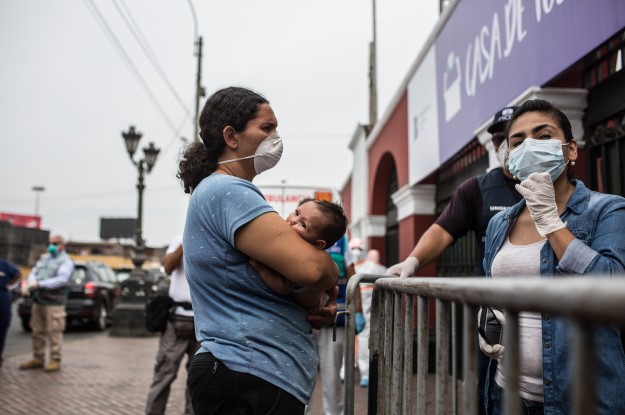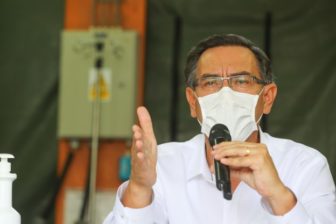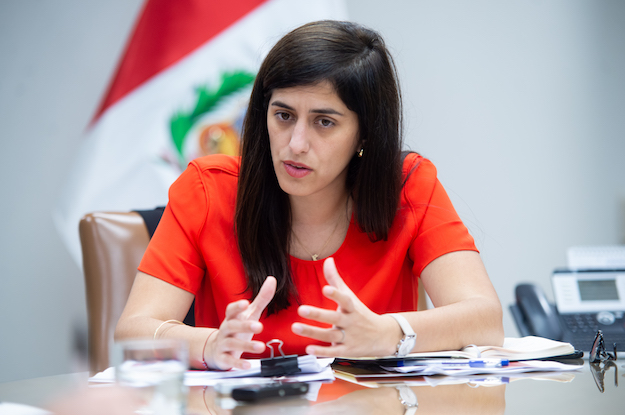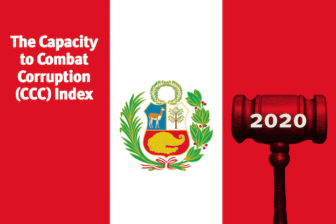This article has been updated.
LIMA – Leonor, her sister, 5-year-old nephew and 3-year-old niece arrived to Peru by bus from Venezuela in August 2019 to reunite with Leonor’s mother. The trip was less harrowing than it could have been because of the transportation provided by an international organization. Other Venezuelan migrants to Peru have been forced to make the journey of over 1,300 miles on foot.
Leonor was among hundreds of migrants and refugees who answered a series of mental health screening questions when we met last August at the border between Ecuador and Peru. The 21-year-old was among the 33% who qualified for generalized anxiety disorder. Another 27% presented symptoms of clinical depression. These rates are far higher than average global rates of 4%-5% for both anxiety and depression – signs of a mental health crisis among Venezuelan migrants that the pandemic has only exacerbated.
Lacking passports and, thus, the possibility of applying for a humanitarian visa, Leonor and her family members entered Peru irregularly.
In Lima, Leonor worked as a massage therapist in different salons, with no formal contract and precarious working conditions. Though she missed Venezuela, life gradually improved. From our representative sample of 800 migrants contacted at the border in August 2019, an estimated 45% of women and 90% of men in our sub-sample were working in February 2020. By then, Leonor and her sister had applied for asylum to regularize their migratory status and neither she nor her sister presented the same anxiety symptoms.
But then came the COVID-19 pandemic.
Leonor and her family believed that the mandatory quarantine announced by the Peruvian government on March 16 would only last two weeks. “We can live with the food we have at home,” she thought.
Yet they – like the estimated 90% of Venezuelan migrants and refugees and upwards of 70% of the Peruvian population that depend on the informal economy – were ill prepared for what followed. Two weeks became one month, which turned into over 100 days of quarantine. Jobs disappeared, incomes vanished, savings dried up. Leonor and most of the nearly one million Venezuelans in Peru returned to living day-to-day as they had before leaving home. Meals were skipped and rent went unpaid.
One month into the lockdown, three out of every four migrant homes reported difficulty covering basic necessities, according to the think tank Equilibrium CenDE.
Venezuelans did not qualify for the state’s social protection mechanisms, including the emergency transfers that the Peruvian government provided to 70% of its citizens. The lack of support networks in their host country and their precarious legal status further limited migrants’ ability to respect the lockdown, placing them and their families at risk of catching and transmitting the virus.
Leonor and her mother tried to make a little money by selling coffee on the sidewalk near their house in Lima’s populous San Juan de Lurigancho district. They both contracted the virus.
By April, anxiety and depression rates had exceeded those registered upon arrival in August, with half of women presenting anxiety disorder symptoms and nearly two in five men. Overall, one in three met the clinical definition for depression.
In other words, one month of the quarantine did more to affect the mental health of a population than their desperation-driven migration the previous year from Venezuela.
The situation was so dire for some, facing hunger and eviction, that they decided to return to Venezuela the same way they had come, walking with little to no money or food.
The future of the Venezuelan population in Peru remains uncertain. Two in five men were working, largely informally, in May, rising to three in five in June. Reintegration into the labor market may help explain the fall in anxiety and depression rates among men, with one in five qualifying for anxiety and only one in twenty for depression.
Yet the unemployment and mental health rates have remained high among women, such as Leonor and her sister. In May, only one in eight women were working, rising to one in four women in June. Although anxiety fell from roughly a third to a fifth between May and June, in both months one in five women qualified for depression.
The easing of the lockdown has not met Leonor’s expectations. “I thought that once things went back to normal, I would return to my job, but when they (the government) advertised the ease of lockdown my boss told me I couldn’t work there anymore because they no longer accepted asylum applications as a legal document to work.”
As Peru enters its worst economic crisis since the era of hyperinflation and internal armed conflict in the 1980s and early 1990s, work opportunities will remain scarce. Discrimination against Venezuelans had already risen throughout 2019, leading the government to de facto end legal immigration from Venezuela, and to make sustainable regularization for those present difficult. Migrants and refugees will face an increasingly hostile labor market in the upcoming months, as a large unemployed Peruvian population competes for opportunities.
Peru, alongside Colombia, had led the region in accepting Venezuelans. Despite the lack of both sustainable regularization programs and the incorporation of largely high-skilled migrants into formal labor markets, there is some evidence of their economic contributions prior to the pandemic.
Now more than ever, the region should conjure the courage to move forward with inclusive policies that recognize not only the vulnerability of the local population, but also that of migrants and refugees who, like Leonor, had begun to integrate into local societies. Not only is it the right thing to do, but it will be essential to successfully fight the pandemic.
This article was updated at the authors’ request.
—
Freier and Bird are professors and researchers, and Luzes is a research assistant at the Universidad del Pacífico.








